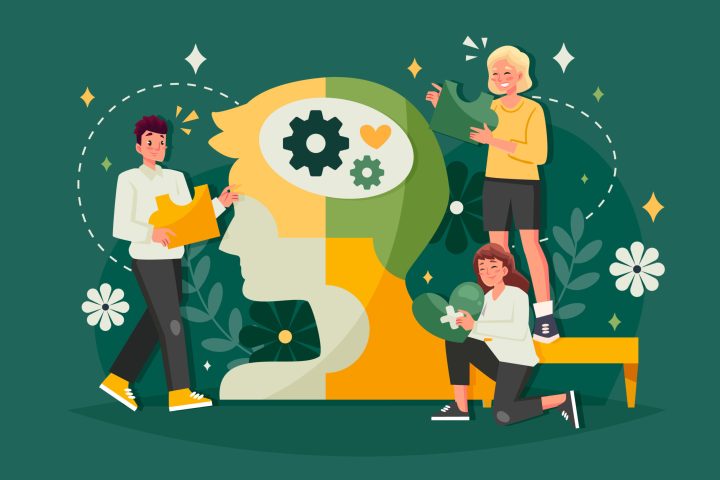EDNOS stands for Eating Disorder Not Otherwise Specified. It includes eating disorders that don’t fit typical categories.
EDNOS can be just as serious as other eating disorders. Eating disorders like anorexia and bulimia are well-known. But some people don’t fit those labels. EDNOS is the term for these cases. It shows that eating disorders are diverse. EDNOS includes many symptoms and behaviors.
It can affect anyone. Understanding EDNOS helps in recognizing its signs. This leads to better support and treatment. Let’s explore what EDNOS is and why it matters.
Topic of Contents
ToggleIntroduction To Ednos
Eating disorders can be complex and varied. One type, often less talked about, is EDNOS. Understanding EDNOS is crucial for recognizing and addressing this condition. This section introduces you to EDNOS.
Defining Ednos
EDNOS stands for Eating Disorder Not Otherwise Specified. It includes eating disorders that do not fit into the categories of anorexia or bulimia. People with EDNOS may have symptoms of both or other eating issues. They often struggle with disordered eating patterns. These patterns can vary greatly from person to person.
Prevalence And Statistics
EDNOS is more common than you might think. Studies show that many individuals with eating disorders fall into this category. In fact, EDNOS cases can be as high as 50% of all eating disorder diagnoses. This high prevalence highlights the need for awareness and understanding. Recognizing the signs of EDNOS is important. Early detection can lead to better outcomes. If you suspect someone has an eating disorder, seek help. Awareness can make a significant difference.
Symptoms Of Ednos
Eating Disorder Not Otherwise Specified (EDNOS) is a serious condition. It includes a range of irregular eating behaviors. Symptoms of EDNOS can be diverse, making it hard to diagnose. Let’s explore the main symptoms of EDNOS under two key categories: Physical Symptoms and Psychological Symptoms.
Physical Symptoms
Physical symptoms can vary widely among individuals with EDNOS. Here are some common signs:
- Fluctuations in weight, either loss or gain
- Irregular menstrual cycles or loss of periods
- Frequent digestive issues like bloating or constipation
- Swollen glands in the neck and jaw area
- Dehydration and electrolyte imbalances
These symptoms may appear sporadically or consistently. Each person’s experience with EDNOS is unique.
Psychological Symptoms
Psychological symptoms are also significant in diagnosing EDNOS. Common signs include:
- Preoccupation with body weight and shape
- Fear of gaining weight
- Frequent mood swings and irritability
- Low self-esteem and negative self-image
- Compulsive behaviors related to food and eating
These symptoms can affect daily life and mental well-being. Recognizing these signs is crucial for seeking help. Understanding the symptoms of EDNOS is the first step. Awareness helps in early intervention and treatment.
Causes Of Ednos
Eating Disorder Not Otherwise Specified (EDNOS) is a complex condition. The exact causes of EDNOS are not fully understood. Various factors can contribute to its development. These factors include biological, psychological, and environmental influences. Understanding these causes can help in managing the disorder.
Biological Factors
Genetics play a significant role in EDNOS. Individuals with a family history of eating disorders are more likely to develop EDNOS. Hormonal imbalances can also contribute to the disorder. Brain chemistry, especially serotonin levels, affects mood and eating behaviors. These biological factors can make some people more prone to developing EDNOS.
Environmental Influences
Societal pressures can impact body image and self-esteem. Media often promotes unrealistic body standards. This can lead to unhealthy eating behaviors. Stressful life events, such as trauma or major changes, can trigger EDNOS. Family dynamics and relationships also play a role. A lack of support and understanding can worsen the condition.
Diagnosis Of Ednos
Diagnosing Eating Disorder Not Otherwise Specified (EDNOS) can be challenging. It involves careful evaluation by healthcare professionals. Understanding the criteria and challenges is crucial.
Diagnostic Criteria
EDNOS diagnosis follows specific guidelines. Patients must exhibit eating disorder symptoms. These symptoms do not fit other eating disorder categories. Doctors look for abnormal eating patterns. They assess body image issues. They check for physical and psychological symptoms.
Challenges In Diagnosis
Diagnosing EDNOS presents several challenges. Symptoms can be vague. They often overlap with other disorders. Patients may hide their symptoms. This makes diagnosis difficult. Accurate diagnosis requires a thorough evaluation. Healthcare professionals need proper training. They must recognize subtle signs. Early diagnosis improves treatment outcomes.
Treatment Options
Eating Disorder Not Otherwise Specified (EDNOS) is a challenging condition. The journey to recovery involves multiple treatment options. Each individual may respond differently to various interventions. Exploring these options can help in managing and overcoming EDNOS.
Therapeutic Approaches
Therapy plays a crucial role in treating EDNOS. Various therapeutic approaches are used based on individual needs.
- Cognitive Behavioral Therapy (CBT): This helps in changing negative thought patterns.
- Dialectical Behavior Therapy (DBT): Focuses on managing emotions and improving relationships.
- Family-Based Therapy (FBT): Involves family members in the treatment process.
- Interpersonal Psychotherapy (IPT): Targets interpersonal issues and their impact on eating behaviors.
Medication
Medication can also be a part of EDNOS treatment. It often complements therapy for better outcomes.
| Medication Type | Purpose |
|---|---|
| Antidepressants | Helps to manage depression and anxiety symptoms. |
| Anti-anxiety medications | Reduces anxiety levels that may trigger disordered eating. |
| Antipsychotics | Used in severe cases to manage mood and behavior. |
Combining therapy and medication often yields the best results. It is vital to work closely with healthcare professionals. They can tailor a treatment plan to your specific needs.
Impact On Daily Life
Eating Disorder Not Otherwise Specified (Ednos) affects many aspects of daily life. Those with Ednos may struggle with food and body image issues. These struggles can disrupt normal activities and relationships.
Social Implications
Ednos can make social interactions challenging. People with Ednos might avoid social events involving food. This can lead to feelings of isolation and loneliness. Friends and family may not understand their behavior. Misunderstanding can strain relationships.
Work And Education
Ednos impacts performance at work or school. Concentration and productivity can decrease. Constant thoughts about food and body can be distracting. Frequent medical appointments may lead to missed work or classes. Physical symptoms like fatigue can reduce energy levels. This can further affect performance and attendance.
Support Systems
Support systems play a crucial role in the journey of individuals with Eating Disorders Not Otherwise Specified (EDNOS). They offer the necessary emotional and practical help needed for recovery. Let’s explore the different types of support systems available.
Family Support
Family support can be a cornerstone in the recovery process. Loved ones provide emotional stability and encouragement. They help in recognizing the early signs and symptoms of EDNOS. Their presence can make the person feel less isolated. Families can also participate in therapy sessions. This helps everyone understand the disorder better. It fosters a supportive environment at home. A caring family can significantly influence the recovery journey.
Support Groups
Support groups offer a safe space for sharing experiences. They connect individuals who face similar challenges. This sense of community can be very comforting. People can learn from each other’s coping strategies. Support groups often include professionals who guide discussions. They can provide valuable resources and advice. Regular meetings help in tracking progress and staying motivated. Joining a support group can be a vital step toward recovery.
Coping Strategies
Dealing with EDNOS (Eating Disorder Not Otherwise Specified) can be challenging. Effective coping strategies are essential for managing this disorder. They help individuals maintain a healthy lifestyle and improve their mental well-being. Here are some practical coping strategies to consider.
Healthy Habits
Establishing healthy habits is crucial for managing EDNOS. Start with balanced meals. Make sure your diet includes a variety of foods. This ensures your body gets the nutrients it needs. Regular exercise is also important. It helps maintain physical health and boosts your mood. Choose activities you enjoy. This makes it easier to stick to a routine. Sleep is another key factor. Aim for 7-9 hours of sleep each night. Good sleep improves your energy levels and mental clarity.
Mindfulness Techniques
Mindfulness techniques can help you stay present and reduce stress. Begin with deep breathing exercises. Inhale slowly through your nose. Exhale through your mouth. Repeat this for a few minutes each day. Try meditation. Find a quiet space and sit comfortably. Focus on your breath. Let thoughts pass without judgment. This practice can calm your mind and improve focus. Journaling is another effective technique. Write down your thoughts and feelings. It helps you understand your emotions better. This can lead to healthier coping mechanisms.
Future Research
Eating disorders not otherwise specified (EDNOS) is a complex condition. It is crucial to understand its nuances and develop effective treatments. Researchers aim to explore innovative ways to support those affected by EDNOS. Future research is paving the way for new treatments and better understanding.
Innovative Treatments
Innovative treatments are essential in managing EDNOS. Researchers are testing new therapies, including cognitive-behavioral approaches. These methods help patients change their eating behaviors. Another area of interest is the role of medication. Some medications may help reduce symptoms of EDNOS. Future studies will determine the effectiveness of these treatments. Technology is also playing a role in treatment. Virtual reality therapy is one example. It helps patients confront and manage their eating issues. Mobile apps are also being developed. These apps provide support and track progress. They offer a convenient way for patients to receive help.
Awareness And Advocacy
Awareness and advocacy are vital in combating EDNOS. Raising awareness helps reduce stigma. It encourages more people to seek help. Advocacy efforts aim to improve policies and support systems. This ensures better access to care for those with EDNOS. Educational programs are part of these efforts. They inform the public about the signs and symptoms of EDNOS. Schools, workplaces, and communities benefit from these programs. They create a supportive environment for those affected by eating disorders. Support groups and online forums also play a role. They provide a platform for sharing experiences. This helps individuals feel less isolated. It fosters a sense of community and support.
Frequently Asked Questions
What Is Ednos Eating Disorder?
EDNOS stands for Eating Disorder Not Otherwise Specified. It’s a type of eating disorder that doesn’t fit specific criteria.
How Common Is Ednos?
EDNOS is very common. Many people with eating disorders fall into this category.
What Are The Symptoms Of Ednos?
Symptoms vary. They can include irregular eating habits, extreme dieting, and excessive concern with body image.
How Is Ednos Treated?
Treatment often includes therapy, nutritional counseling, and sometimes medication. A healthcare professional can create a personalized plan.
Conclusion
Understanding EDNOS eating disorder is crucial for better mental health awareness. It affects many people. Early detection and support can make a big difference. Seek professional help if needed. Educate yourself and others about EDNOS. Share this knowledge to break the stigma.
Remember, recovery is possible with the right support. Stay informed, stay empathetic, and offer help to those in need.







